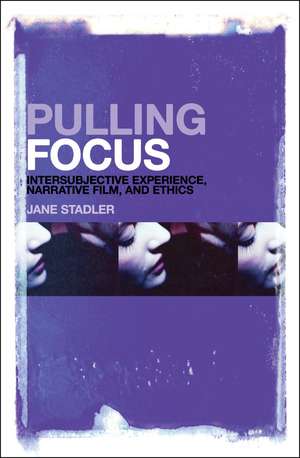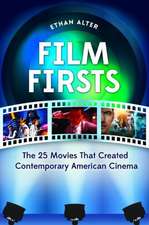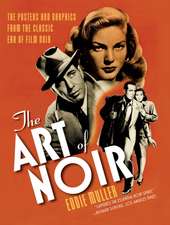Pulling Focus: Intersubjective Experience, Narrative Film, and Ethics
Autor Dr. Jane Stadleren Limba Engleză Paperback – 23 mai 2012
The most powerful films have an afterlife. Their sensory appeal and their capacity to elicit involvement in story, character and conflict reaches beyond the screen to subtly reframe the way spectators view ethical issues and agents within the narrative, and in the world outside the cinema. Pulling Focus: Intersubjective Experience and Narrative Film questions how cinematic narratives relate to and affect ethical life. Extending Martha Nussbaum and Wayne Booth's work on moral philosophy and literature to consider cinema, Dr. Stadler shows that film spectatorship can be understood as a model for ethical attention that engages the audience in an affective relationship with characters and their values. Building on Vivian Sobchack's Address of the Eye and Carnal Thoughts, she uses a phenomenological approach to analyse ethical dimensions of film extending beyond narrative content, arguing that the camera describes experience and views screen characters with an evaluative form of perception: an ethical gaze in which spectators participate. Films discussed include Dead Man Walking, Lost Highway, Batman Begins, Nil By Mouth, and Eternal Sunshine of the Spotless Mind.
Preț: 273.42 lei
Preț vechi: 349.57 lei
-22% Nou
Puncte Express: 410
Preț estimativ în valută:
52.33€ • 54.43$ • 43.20£
52.33€ • 54.43$ • 43.20£
Carte tipărită la comandă
Livrare economică 15-29 aprilie
Preluare comenzi: 021 569.72.76
Specificații
ISBN-13: 9781441163028
ISBN-10: 1441163026
Pagini: 288
Ilustrații: 42
Dimensiuni: 152 x 231 x 20 mm
Greutate: 0.5 kg
Editura: Bloomsbury Publishing
Colecția Continuum
Locul publicării:New York, United States
ISBN-10: 1441163026
Pagini: 288
Ilustrații: 42
Dimensiuni: 152 x 231 x 20 mm
Greutate: 0.5 kg
Editura: Bloomsbury Publishing
Colecția Continuum
Locul publicării:New York, United States
Caracteristici
No published research on film currently engages with narrative ethics, or offers an accessible phenomenological account of spectatorship focussing on imaginative, affective responses to cinematic narratives.
Notă biografică
Jane Stadler is Senior Lecturer in Film and Television at the School of English, Media Studies, and Art History at the University of Queensland. She is co-editor of Pockets of Change (with Tricia Hopton, Adam Atkinson, and Peta Mitchell, 2011), co-author of Media and Society (with Michael O'Shaughnessy, 2012) and Screen Media (with Kelly McWilliam, 2009), and has published journal articles on phenomenology, ethics, aesthetics, identity, and screen landscapes.
Cuprins
Chapter 1: Ethics in Narrative Form and Content
Chapter 2: A Phenomenological Approach to the Ethics of Film
Chapter 3: Losing the Plot: Narrative Structure and Ethical Identity
Chapter 4: Under the Influence: Vice, Violence and Villainy
Chapter 5: Resistance and Responsiveness: Emotion and Character Engagement
Chapter 6: Imagination: Inner Sight and Silent Voices
Chapter 7: Seeing in the Dark: Cinema, Ethics, and Alternative Engagement
Recenzii
Mention -Chronicle of Higher Education, December 19, 2008
First published when the ethical implication of viewer and film was not on the agenda of contemporary film studies, Pulling Focus: Intersubjective Experience, Narrative Film, and Ethics was a courageous exploration of how narrative cinema both presents and solicits an ethical gaze. Now in paperback, Stadler's groundbreaking work can take its proper place at the forefront of a growing body of literature that recognizes that any axiology of cinema entails ethics as well as aesthetics. Moreover, the book's accessible and graceful prose and its convincing phenomenologoical interperetations of a range of well-known films make it an ideal text for the undergraduate and graduate classroom. --Vivian Sobchack, UCLA, School of Theater, Film and Television
"The author is interested in the camera as a narrator that guides spectators to judgment and engages their sensory apparatus and capacity for affect in reshaping what might otherwise by abstract and rational judgment....Stadler interprets several films, doing especially well with David Lynch's enigmatic Lost Highway, which unsettles notions of narrative genre, identity, and morality. SUMMING UP: Recommended."- Choice
First published when the ethical implication of viewer and film was not on the agenda of contemporary film studies, Pulling Focus: Intersubjective Experience, Narrative Film, and Ethics was a courageous exploration of how narrative cinema both presents and solicits an ethical gaze. Now in paperback, Stadler's groundbreaking work can take its proper place at the forefront of a growing body of literature that recognizes that any axiology of cinema entails ethics as well as aesthetics. Moreover, the book's accessible and graceful prose and its convincing phenomenologoical interperetations of a range of well-known films make it an ideal text for the undergraduate and graduate classroom. --Vivian Sobchack, UCLA, School of Theater, Film and Television
"The author is interested in the camera as a narrator that guides spectators to judgment and engages their sensory apparatus and capacity for affect in reshaping what might otherwise by abstract and rational judgment....Stadler interprets several films, doing especially well with David Lynch's enigmatic Lost Highway, which unsettles notions of narrative genre, identity, and morality. SUMMING UP: Recommended."- Choice












